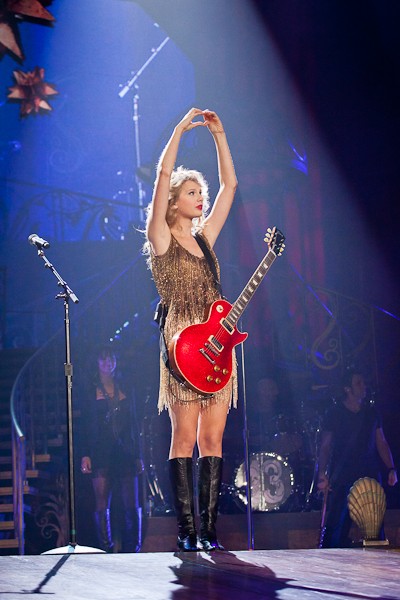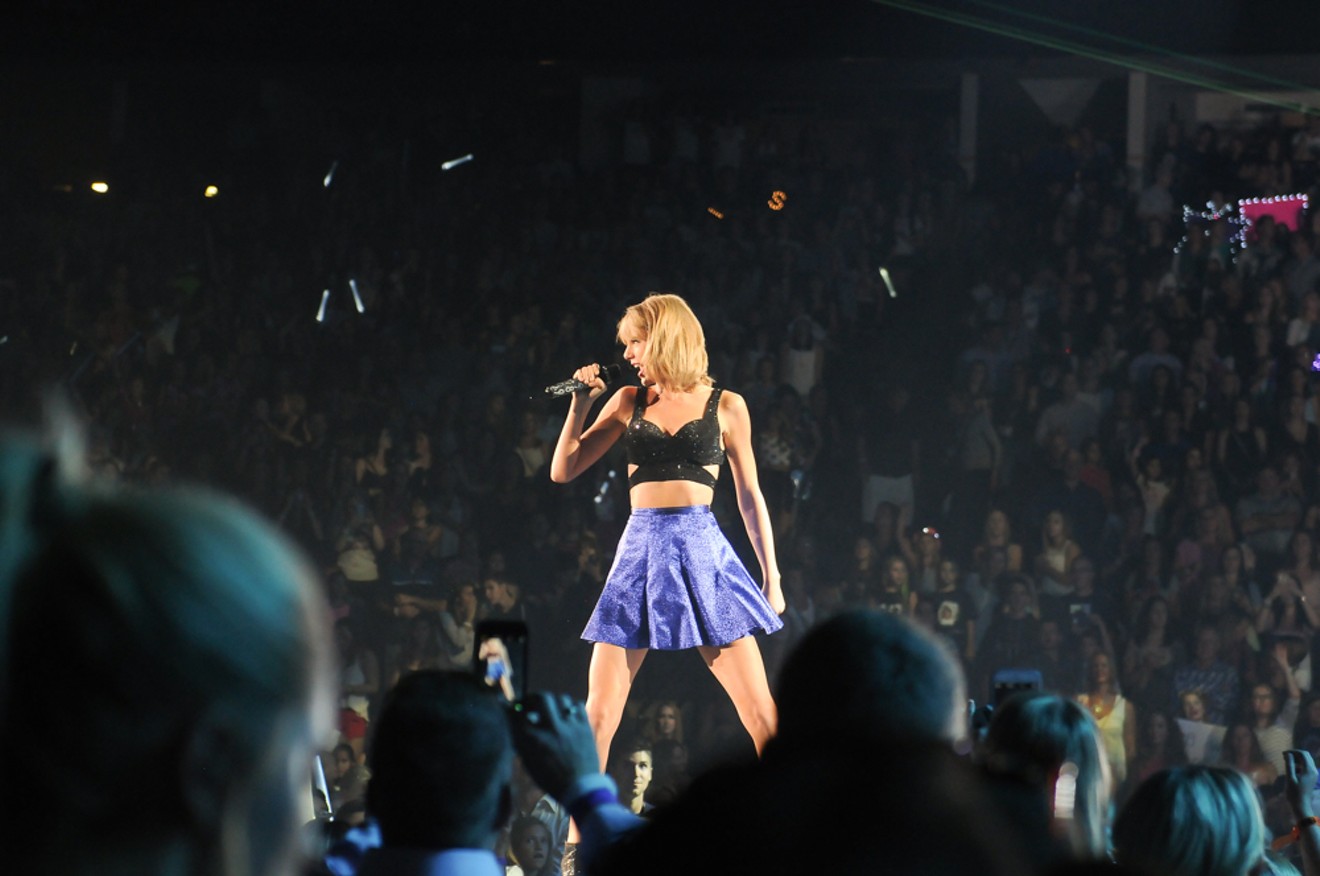At the 1989 tour stop, Swift was in full pop-goddess mode, wearing a glittery crop top, her face magnified on a screen so fans like me could see her sing and strut amid a sea of male backup dancers, even from the back of the football stadium. But twenty feet from me on the eighth floor of a Denver federal courthouse, hand on her mother’s as she awaited the verdict, Swift was simply a woman in the all-too-common position of waiting for someone to take her at her word that a man had touched her body without her consent. And for a scary half-second, I was afraid that, despite a clear case argued by a high-powered legal team and backed by both witnesses and photographic evidence, the answer would be no.
I first became a Taylor Swift fan in sixth-grade gym class. Sitting next to my best friend, Ally, our pasty legs in their black mesh gym shorts stretched out on the wooden floor, I told her about a song I’d been listening to, about an unrequited crush on a boy named Drew. She said she’d been looping one about an angry ex-girlfriend planning revenge on the erstwhile object of her affections. Both songs, we discovered, were Taylor Swift's.
Since then, Swift has metamorphosed. Gone are the corkscrew curls, banjo strumming and the sundress-and-cowboy-boot getups my friends and I tried to emulate when we went to her 2011 Speak Now tour. The boys she writes songs about are no longer senior football players in Tennessee, but top-of-the-Hollywood-pack performers like Tom Hiddleston or a Kennedy scion. Throughout it all, she’s carefully sought to maintain a wholesome image for the legions of girls and young women who idolize her: Any references to sex are veiled in misty romanticism, and the strongest substance she’s ever mentioned in a song is red wine.

Swift holding up a heart symbol to the audience on her Speak Now tour, when her music still veered country.
Chip Kalback
As she’s earned wild success (winning ten Grammys and becoming the first woman to win Album of the Year twice) and transitioned to pop, Swift’s public image has stayed as polished. Save for her close relationships with her biggest fans and her charitable giving, which have always seemed warm-hearted and genuine, her presence has struck commentators like The Daily Beast’s Amy Zimmerman as “both calculating and enviable.”
This veneer cracked last year when Kim Kardashian West exposed that despite publicly decrying Kanye West’s (in my opinion, total banger) “Famous” as “misogynistic,” Swift had approved the reference to her (though not the rapper calling her “that bitch”). The internet abounded with think pieces about how “Taylor Swift Plays the Victim” and Swift’s social media swarmed with snake-emoji comments. This year, she’s kept a low profile.
My admiration of Taylor Swift has become more tempered and less breathless than it was in sixth grade or even three years ago on the last night of summer, when Ally and I drove around her neighborhood in circles because “Shake It Off” had finally come on the radio. Still, I’m clear on how harmful and misguided it is to extend the “playing the victim” narrative to her sexual-assault trial. It’s one thing to recognize that the animosity in Swift’s media-swollen feud with Katy Perry goes both ways. It’s another matter entirely to downplay a woman’s traumatic experience of sexual assault because of extraneous actions and unflattering headlines.
Regardless of how oversized you think Swift’s surprised reactions are as she racks up awards, the emotion in the courtroom was genuine and often painful. It was hard to watch Swift’s outraged expression as attorney Gabriel McFarland – making his closing argument on behalf of Swift’s groper, former DJ David Mueller – crouched down to demonstrate to the jury exactly how his client would have had to move to reach under Swift’s stiff skirt to have, as he put it, “grabbed a handful.” It was even more upsetting and offensive when McFarland displayed the photo of the incident and queried, “Ask yourself: Is that the face of someone who just had a strange man grab their butt?” (detect the not-so-subtle whiff of “it couldn’t have been rape because she enjoyed it” rhetoric), and Swift turned her back to the media, so I could only see her blond bun and the tissues amassing on the table as she seemed to dab away tears and blow her nose.
I ached that Swift, like many victims of sexual assault, had to spend six days in court in the same room as the man who’d groped her, having her experience questioned from every angle. I’m aware the media coverage only exacerbated this problem; observing and documenting the trial did feel exploitative. I and other journalists aimed to prioritize accuracy and hoped our reporting would bring attention to the prevalence of workplace assault. Still, it’s hard to know when humanizing detail crosses the line into tabloid fodder, especially when there were hordes of curious Swifties following along. (I was up-front with my editors about my own fandom so we could keep my articles even-handed.)

Taylor Swift in court on the day of the verdict, as depicted by illustrator Jeff Kandyba, looking much more serious than during a 2015 Denver concert.
Denver7 via YouTube/Miles Chrisinger
The fact that even celebrities with an estimated net worth of $280 million are, in fact, human, isn’t a hot take. But seeing someone as influential (remember when she changed Apple Music’s mind about royalties?) and media-savvy as Swift, someone whose music was the soundtrack to my girlhood, sigh with relief as she won a deeply relatable case — that seemed new and powerful. In the courtroom, giving snarky, frank testimony or watching the jury with anticipation, Taylor Swift, impenetrable megawatt celebrity, was everywoman. Her “horrifying and shocking” experience at a meet-and-greet was a variation of the handsy guy pushing past you in a theater, the unknown and unwelcome hands at your hips at a club or dingy frat party, the creepy person touching your thigh on public transportation while giving a “compliment.” Swift’s lawyer, J. Douglas Baldridge, said in his closing argument that the nominal $1 Swift had requested in damages “is of immeasurable value.... It means ‘no means no,’ and it means every woman can determine what is tolerable to her body.” I agree.
Swift is, like many of us, a woman navigating a world where all of her charisma and accomplishments cannot always safeguard her from being treated as a body that’s up for grabs.
tweet this
Even Taylor Swift will tell you that she’s not your average woman. A statement released minutes after her trial victory read, in part, “I acknowledge the privilege that I benefit from in life, in society and in my ability to shoulder the enormous cost of defending myself in a trial like this...I will be making donations in the near future to multiple organizations that help sexual assault victims defend themselves." This tangible step and her countersuit are the sorts of concrete action the largely apolitical singer has been critiqued for forgoing in the past. Yes, Swift has been criticized as a “spineless” white feminist whose version of female solidarity is a #squad of size-zero supermodels strutting around a soundstage in black leather to a diss track about Katy Perry, or as someone whose Lena Dunham-rooted feminism surfaces only for the sake of optics and lacks a grasp of intersectionality. Her sexual-assault suit doesn’t excuse past shortcomings (none of us are perfect), but in this moment, Swift deserves vocal support.
The trial of a star once described as someone who “will never be an underdog again” also merits some clear-eyed confrontation of how we address all instances of sexual assault. It’s sobering that even with her high-powered team of D.C. lawyers, confidence on the stand and litany of witnesses, Taylor Swift, a millionaire who stands at 5’ 11” even without the towering designer ankle boots on her feet, was almost an underdog, worried the jury would listen to a man who argued that because she was smiling in a photo, the groping incident just wasn’t possible.
I had thought the most my life would ever overlap with Taylor Swift’s would be when I jammed a dollar bill into a jukebox with alcohol-clumsy fingers so I could loudly sing about "feeling 22" on my birthday. But I was wrong: Swift is, like many of us, a woman navigating a world where all of her charisma and accomplishments cannot always safeguard her from being treated as a body that’s up for grabs.
As the jury stood to leave, Swift mouthed, “Thank you.” I’m going to echo it back to her the way I did when she held the mic out to the crowd at that California concert: Thank you, Taylor.












